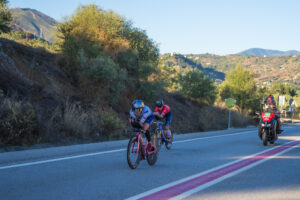2 runners die during Zugspitz Extrem-Berglauf
A sudden weather change with sub freezing temperatures caught the participants at the 8th Annual International Zugspitz Extrem-Berglauf by surprise and 2 runners ended up dead seemingly from exposure and exhaustion, reports the Sueddeutsche Zeitung.
The Zugspitz Extrem-Berglauf roughly translates as "Zugspitze extreme uphill running race" and is 16.5km in length and goes up around 6,889 feet to the top of the Zugspitze, Germany's highest mountain peak (9717 feet). Roughly 600 runners started the race on Sunday, July 13 in Ehrwald, Austria under rainy conditions and temperatures around 50 degrees. As the runners got higher and higher the temperatures started to drop and soon the runners saw rain changing to snow and the wind picking up. Some of the participants only wore shorts and t-shirts and were now exposed to sub freezing temperatures. Alarms went out as people noticed participants in trouble and over 80 mountain rescue guides were sent to assist. 6 runners were transported to the Garmisch Partenkirchen Klinikum and treated for exposure and exhaustion, but for 2 runners all help apparently came too late. They died about 2,524 feet below the top as the could not be resuscitated.
This brings up the heated discussion again as to who is to blame for such an incident. Should the organizers be held responsible for not canceling the event or finishing the run at a lower altitude? There is also the school of thought that these extreme athletes know quite well what they are in for during events like this. The event was shortened the year prior and the Sueddeutsche Zeitung quoted 2 time World Berglauf Champion Helmut Reitmeir that the runners then were "very upset." We also have noticed heated debates about this topic in the Slowtwitch forum when a race director for example has opted to cancel the swim or considers shortening the run course for safety reasons.
The district attorney's office in Munich is now checking into the Zugspitze case to see if any charges need to be brought up.
Via: sueddeutsche.de






